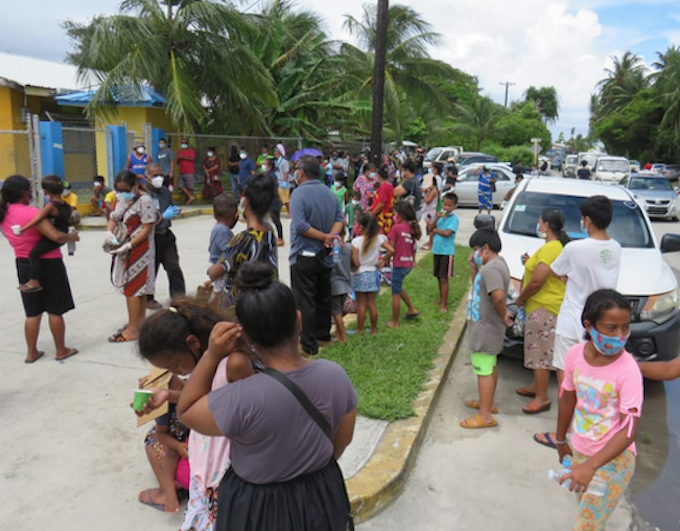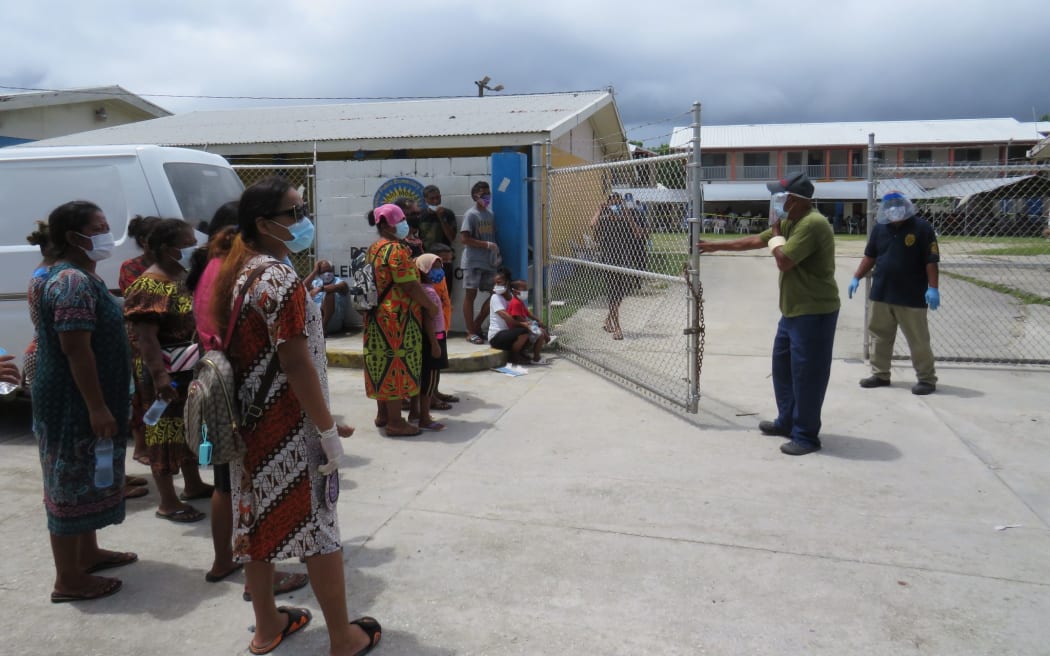
By Giff Johnson, Marshall Islands Journal editor and RNZ Pacific correspondent in Majuro
The Marshall Islands is a live demonstration that the omicron BA.5 variant is the most contagious covid variant yet to appear.
In the first five days of the outbreak in the Marshall Islands, more than 10 percent of the population in Majuro, the capital, has tested positive, reports the Ministry of Health and Human Services.
From initial confirmation of a handful of positive cases in the community on August 8, the number of positive cases skyrocketed to the one-day total of 1064 testing positive on Saturday, August 13, at the three community-based “alternative care sites” established to test and treat local residents.
This brings Majuro’s total in the wake of the outbreak to more than 2000 cases in a population estimated at 20,000. There were nine early hospitalisations, with most reported to be recovered by Sunday.
President David Kabua on Friday signed a proclamation of a “State of Health Disaster,” which outlines duties of all ministries and government agencies to respond.
It also gives the government the power to access emergency funding for the response to the initial outbreak.
Health authorities reported two deaths in the first week — both men. The first was a 23-year-old man, the second a 69-year-old.
Both pronounced dead
They were both pronounced dead on arrival at Majuro Hospital’s emergency room, Health officials said. Their vaccine status was not announced.
Majuro experienced a chaotic first couple of days as alternative care sites (ACS) were rolled out at two local schools and at an outdoor sports court, with thousands of islanders crowding in to get tested.
By Friday the influx of hundreds of volunteers to support the Ministry of Health and Human Service in managing the flow of people led to improvements in the service.
“What we are seeing at these sites is what we expected, the ACS sites are getting better and more organised as we go along,” said Health Secretary Jack Niedenthal Sunday.
“Much of the chaos is beginning to die down, though it is still there for sure, but this will continue to get better.”
Spread was not contained to Majuro Atoll, the capital. Within a day of the initial confirmation of positive cases in the Majuro community last Monday, the first case was identified on Ebeye, the densely populated community next door to the US Army’s Reagan Test Site at Kwajalein Atoll.
In addition, several isolated outer atolls at week’s end were reporting multiple residents with covid-like symptoms.
All remote island flights suspended
All flights on Air Marshall Islands and all government ships to remote islands were suspended August 9 in an effort to contain the spread. But travellers from the previous week to remote islands unwittingly caused the spread.
August 12, a special Air Marshall Islands flight took a health team to Wotje Atoll, confirming multiple positive cases, training the local health aide to conduct further testing, and leaving a supply of PaxLovid and other therapeutic medicines for islanders, according to health officials.
RMI COVID-19 Update eo in an 08-12-2022. pic.twitter.com/lsjjXfWVin
— V7AB Radio Marshall Islands (@v7abradio) August 11, 2022
Health teams were attempting to visit other remote islands for similar follow up Sunday, but all AMI pilots reportedly tested positive, putting flights in limbo.
Although the government did not require a lockdown, most churches cancelled in-person services Sunday and the one main road in the capital atoll was unusually quiet as people appeared to be staying home.
Restaurants also saw the number of customers decline dramatically, although most continued to see ongoing demand for takeout meals.
“We at the Ministry of Health and Human Services are very proud of the response that has come in from all corners of our country to help us deal with the health crisis,” said Niedenthal.
The ministry struggled in the initial phase of the outbreak with more than 200 of its staff, including many doctors and nurses, testing positive for covid — many exposed before they knew it was circulating in the community.
Covid-free success
Until last week the Marshall Islands had successfully employed some of the world’s strictest quarantine rules for people entering the North Pacific nation. This had kept it covid-free for the first two-and-a-half-years of the covid pandemic.
A reduction of quarantine time in recent weeks, coupled with unprecedented numbers of people coming in through the managed quarantine process is suspected to be the cause of the outbreak.
The government had earlier announced it was going to eliminate the managed quarantine requirement and open the borders on the October 1.
“As expected, the outbreak continues to gain strength,” Niedenthal said on Sunday.
“We had over 1000 cases in Majuro yesterday, almost double from the previous day. About 75 percent of the people we test are positive, which is an incredibly high positivity rate.”

Outbreak escalating
Last week, as the outbreak was escalating, Majuro traditional leaders sent a letter to President Kabua calling for the borders to be closed and opposing the announcement that medical teams arriving this week would not be required to quarantine.
The medical surge support teams are from the US Centers for Disease Control and other agencies. Niedenthal emphasised the importance for delivering services to the public by these medical professionals.
He described these as “boots on the ground medical support professionals” and said they would be tested on arrival and then sent right into the field to support ongoing services by local Health authorities.
“As a country we have moved from prevention to mitigation because we are now fighting this disease,” he said.
“The days of quarantine upon arrival are now over. I know some people are nervous about this, but we at the Ministry of Health are not and we are the ones on the frontline,” Niedenthal said.
“Please respect these public health decisions. We knew this would have to be a fast shift in strategy that would trouble some people because we had been working so hard (and) successfully to prevent the disease from coming into the Marshall Islands.”
This article is republished under a community partnership agreement with RNZ.











































